Understanding Depression: An All-Inclusive Guide
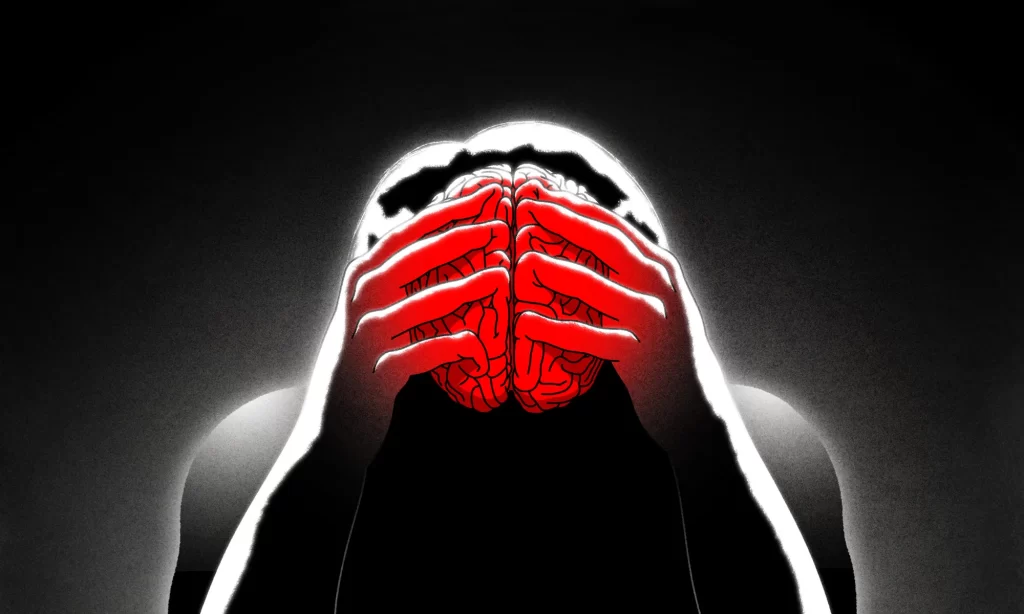
Millions of individuals worldwide are impacted by the intricate and multidimensional mental health illness known as depression. It’s more than simply a bad day or a depressed mood; it’s a serious illness that affects many facets of life, including relationships, physical health, emotional stability, and day-to-day functioning.
This article examines depression’s characteristics, signs, and causes as well as available treatments and methods for controlling and recovering from the illness.
What is the Depression?
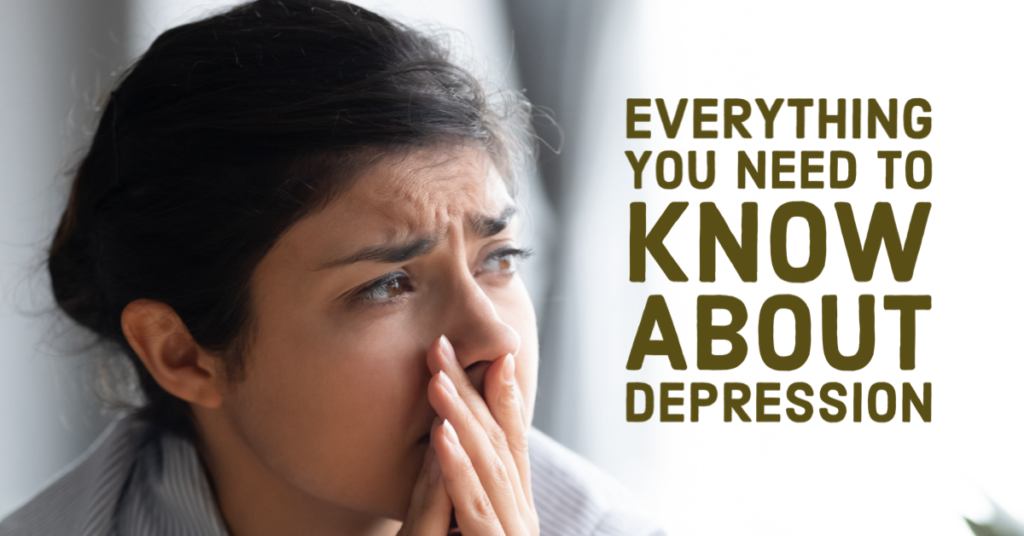
Major depressive disorder (MDD), the professional term for depression, is a mental illness marked by enduring feelings of melancholy and hopelessness as well as a lack of interest in or enjoyment from once-enjoyed activities. These symptoms may make it difficult to eat, sleep, work, or carry out daily tasks.
The World Health Organisation (WHO) lists depression as one of the major global causes of disability. People from many walks of life are affected by it, and it can happen at any age. Everyone goes through times when they’re depressed or unhappy, but clinical depression is more severe and persists longer.
Depression Signs and Symptoms

The symptoms of depression can vary from person to person and can take many different forms. But typical indications and symptoms consist of:
A constant, unwavering sense of melancholy or emptiness is known as persistent sadness.
Loss of Interest: A noticeable decline in the enjoyment of once-enjoyed activities, such as sex, hobbies, or social interactions.
Appetite Changes: Notable weight loss or gain, or adjustments to eating patterns, such as overindulging in food or too little.Sleep disturbances include hypersomnia (sleeping excessively) and insomnia (difficulty falling asleep).
Fatigue: A continuous state of exhaustion or low energy, even after getting enough sleep.
Feelings of Worthlessness: Feelings of self-blame and excessive guilt.
Difficulty Concentrating: Having problems concentrating, choosing, or recalling details.
Physical symptoms may include headaches, stomach issues, or unexplained aches and pains.
Suicidal thoughts include thoughts of ending one’s life, suicide, or self-harm attempts.
A major depressive disorder diagnosis can only be made if symptoms have persisted for at least two weeks and significantly interfered with day-to-day functioning.
Reasons and Danger Elements
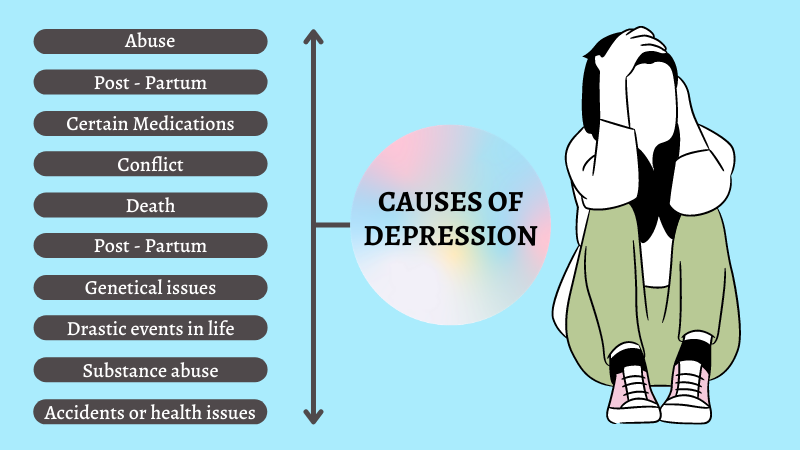
A complex interaction of biochemical, psychological, environmental, and genetic elements leads to depression. Although the precise cause is still unknown, a number of things could have led to its emergence:
hereditary Factors: There may be a hereditary susceptibility to depression because it can run in families. But a person’s likelihood of developing depression is not increased by a family history of the illness.
Biological Factors: Depression may result from imbalances in neurotransmitters, which are brain chemicals that control mood. Hormonal fluctuations and long-term illnesses are examples of additional biological variables.
Environmental Factors: Depressing life situations include losing a job, experiencing relationship difficulties, or a loved one passing away. Abuse or trauma experienced as a child is another important risk factor.
Psychological Factors: Characteristics like a propensity for pessimism or low self-esteem can make a person more prone to depression. Negative thought patterns, or cognitive distortions, are another factor in the illness.
Social Factors: Depression episodes can be aggravated or precipitated by a lack of social support, loneliness, and persistent interpersonal issues.
Depression Diagnosis
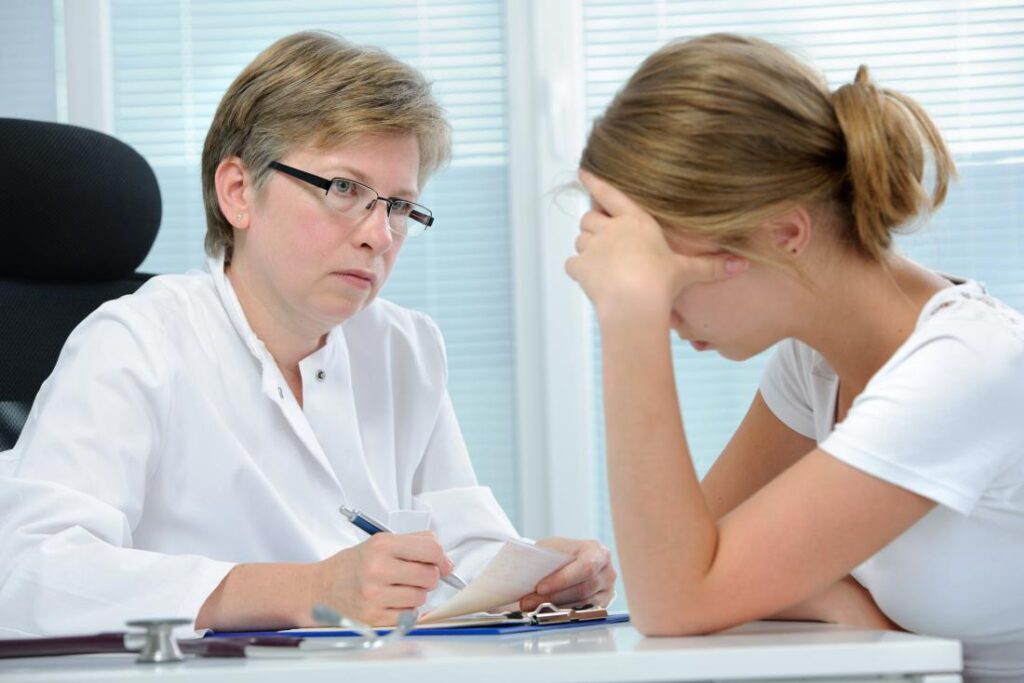
A comprehensive assessment by a mental health specialist is necessary to diagnose depression. Usually, the procedure entails:
Clinical Interview: The physician will enquire about the nature, duration, and impact of the symptoms on day-to-day functioning. Enquiries into personal history, family history of mental health issues, and potential contributing factors will also be made.
Physical Examination: To rule out other medical problems that might be the source of the symptoms, a physical examination may be done. Blood testing and other diagnostic procedures may be part of this.
Diagnostic Criteria: To ascertain whether the symptoms fit the bill for major depressive disorder, the doctor will use standardised criteria, such as those included in the Diagnostic and Statistical Manual of Mental Disorders (DSM-5).
Options for Depression Treatment
There are several efficient therapies for depression, and it is treatable. The most effective strategy frequently combines therapy in a way that is specific to the demands of the patient. Options for treatment consist of:
Medication

To help control mood, antidepressants are frequently recommended. Antidepressants come in a variety of forms, including:
First-line treatments frequently involve the use of selective serotonin reuptake inhibitors (SSRIs), which raise serotonin levels in the brain.
Serotonin and norepinephrine are both impacted by serotonin-norepinephrine reuptake inhibitors, or SNRIs.
Older drugs called tricyclic antidepressants (TCAs) have a higher potential for negative effects but can also be quite effective.
Monoamine oxididase inhibitors (MAOIs):
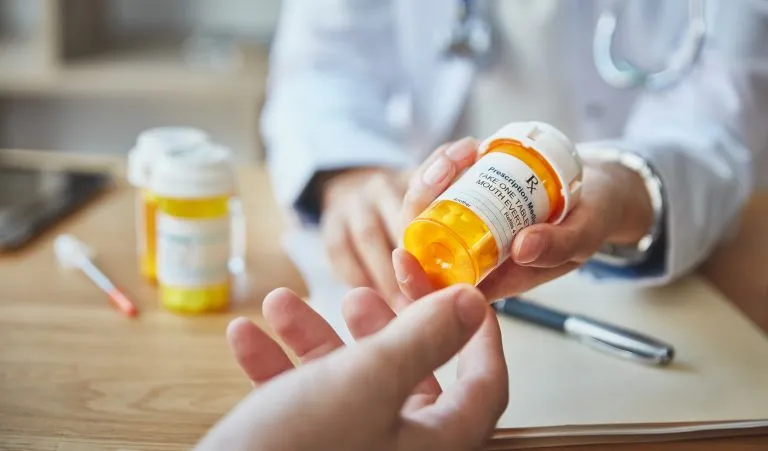
Due to dietary limitations and drug interactions, these medicines are used less frequently.
To identify the best drug and dosage with tolerable side effects, people should collaborate closely with their healthcare professional.
Psychotherapy, sometimes referred to as talk therapy, assists people in identifying and resolving the underlying problems that are causing their depression. Typical methods include of:
The goal of cognitive behavioural therapy, or CBT, is to recognise and alter harmful thought processes and behaviour patterns.
Social functioning and interpersonal relationships are the focus of interpersonal therapy (IPT).
Examines fundamental psychological factors and unsolved issues in psychodynamic therapy.
Treatment can offer helpful coping mechanisms and techniques for managing depression and enhancing emotional health
Modifications to Lifestyle

Adopting a healthier lifestyle can improve mental health in general. This comprises
Frequent Exercise: Research has demonstrated that exercise improves mood and lessens depressive symptoms.
A nutritious, well-balanced diet has a positive effect on energy and mood.
Sleep hygiene: Developing healthy sleeping patterns can enhance both the general mental health and quality of sleep.
Stress management: Mindfulness, meditation, and relaxation techniques are a few ways to assist control stress.
Support Groups: Making connections with people who are going through comparable difficulties can offer both practical guidance and emotional support. Support groups provide a sense of community and can be found online or in person.Alternative Therapies: Some people look into supplementary or alternative therapies like yoga, herbal supplements, or acupuncture. The evidence for these treatments varies, but when combined with traditional medicines, they might offer more support.
Handling and Surviving Depression
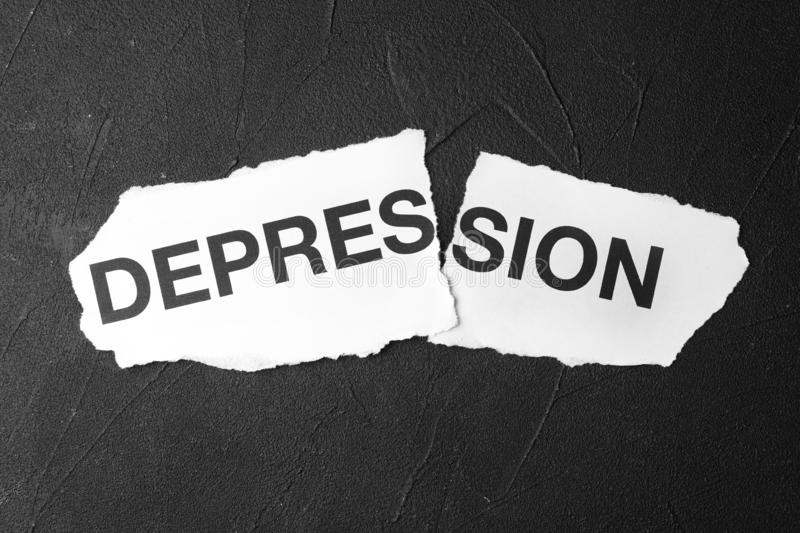
Apart from receiving official therapy, there exist techniques that people can employ to effectively handle and get through depression:
Create a Schedule: Having a daily schedule can give life structure and a sense of regularity. This can include consistent mealtimes, physical activity, and hobbies.
Establish Small Goals: Dividing work into smaller, more doable steps can help alleviate overwhelm and increase a sense of achievement.
Create a Support System by Keeping in Touch with Friends, Family, and Support Organisations. Feelings of loneliness can be lessened and encouragement can be given by social support.
Exercise Self-Compassion: Recognise that you are not alone in your struggle with depression and treat yourself with kindness. Put self-care first and refrain from criticising yourself.
Seek Professional Assistance: Get assistance from a professional if symptoms get worse or do not get better after starting treatment. It could take some time to choose the best treatment choice out of the numerous available.
The Value of Asking for Assistance
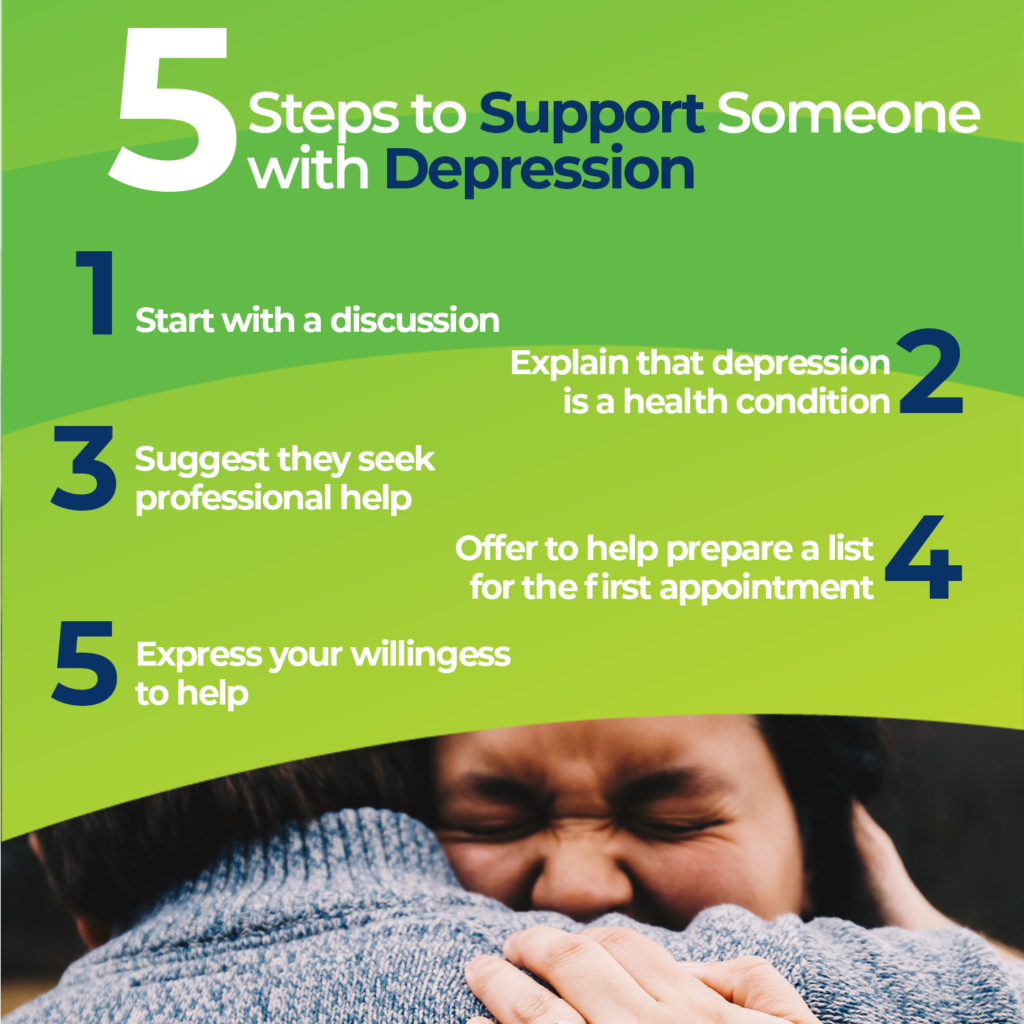
It is imperative that anyone exhibiting symptoms of depression consult a mental health professional for assistance. Depression can be treated, and better results can be obtained with early intervention. Do not be afraid to ask for help if you or someone you love is experiencing depression.
In summary
Depression is a severe mental illness that has an impact on many facets of daily life. It is crucial to comprehend the illness’s causes, symptoms, and available treatments in order to manage and recover from it. People with depression can live happy, productive lives and have better mental health with the right care and assistance. Recall that there is hope for rehabilitation and that asking for assistance is a show of strength. Speak with a mental health professional if you or someone you love is experiencing depression to start the process of getting better.
